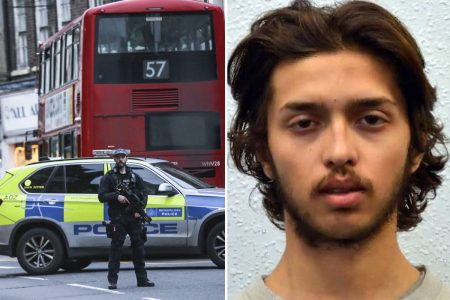
Dangerous terrorists like Sudesh Amman should stay behind bars
As police and MI5 manage ever longer lists of terrorism cases, we are all thankful that they were able to intervene so speedily in Streatham on Sunday.
But they will not always be able to do so and the challenge now is to shorten those lists. This requires a new approach focused on ensuring dangerous terrorists are kept in prison and attacking the root causes of extremist ideologies, not simply expecting systems designed to deal with criminality motivated by greed, lust or power to cope with such a different problem.
For four years, I was Assistant Commissioner at New Scotland Yard, leading National Counter Terror Policing, and while terrorism was developing many of the characteristics of a volume crime, the fundamental difference is that ideology is at its heart. The role of police and security services is to protect the public, but we need to be honest that they can only suppress and control terrorist threats – not solve the ideology or theology that underpins them.
What, then, needs to change?
First, cut off the supply. Sunday’s terrorist was, like many, radicalised as a teenager. Many are identified and turned around early in their radicalisation by Prevent, but the work to counter the ideology is weaker. Most members of the public would be horrified by the volumes of gruesome and ideologically violent material that offenders pick up online, yet which steers around current terrorist and hate crime laws. In every such case that I saw, police found hundreds of pieces of ghastly material in terrorists’ possession and yet, as in this case, only a handful were prosecutable.
The last Government tried but failed to bring in new laws – largely struggling to find a workable definition of extremism. A renewed effort, based on Counter Extremism Commissioner Sara Khan’s recommendation for a focus on “hateful extremism”, should be pursued. It is significant that Chief Coroner Mark Lucraft QC, in last year’s London Bridge inquest, was concerned that there is “no offence of possessing terrorist or extremist propaganda material”, and recommended that the Home Office consider legislation.
Second, several years ago I started pointing out that, despite the debate about returning foreign fighters, over the next few years, greater numbers of dangerous terrorists would return to the streets of Britain from prison than from Raqqa. When police and security services put a terrorist in prison, it is vital to separate them from other inmates to prevent them from polluting vulnerable criminals, and throw the best deradicalisation programmes at them. We pride ourselves on being civilised. Providing terrorists the best opportunities to turn their lives around is a mark of that civilisation.
Third, however, we need brutal clarity on when convicted terrorists are released from prison. The Prime Minister has shown determination to end automatic releases and use much more intrusive methods, including lie detectors, to assess the fitness for release for serious terrorism offences, but this needs extending to all terrorist offences. To argue that offenders who only possess and disseminate terrorist material – which may include a “how to do guide” for terrorists – are not violent is naive. As Streatham shows, they may just not yet have had the opportunity to turn their hatred into violence.
Further, given that the number of terrorists set to be released from prison in the coming months is now into three figures, the Government is correctly planning retrospective law changes to stop this. I am sure weary officials will argue against this, but if we were able to change the law retrospectively to enable the retrial and conviction of the Stephen Lawrence murderers, it is right to take a similar approach to dealing with a pressing national security threat.
We have an effective and growing counter-terrorism machine of integrated police and MI5 teams, but it would be foolish to hope that they can manage and prioritise ever-longer lists of terrorists. A counter-extremism machinery that cuts off radicalisation, and a justice system that intelligently reforms the willing, and assertively controls those with embedded twisted ideology, is urgently required.
Source: Telegraph





